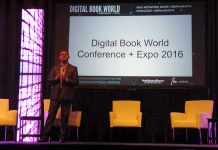 Richard Nash, Cursor; Eoin Purcell, Green Lamp Media; Chris Morrow, Northshire Books; Angela James, Carina Press discussed this at Digital Book World. Notes:
Richard Nash, Cursor; Eoin Purcell, Green Lamp Media; Chris Morrow, Northshire Books; Angela James, Carina Press discussed this at Digital Book World. Notes:
Northshire Books: physical bookstores still exist. Print on demand at the retail level. Installed an Espresso 2 years ago (similar machine in photo).
Print 3 categories: self published, public domain, copyrighted books. With state of software, have been doing self published books and they make up 2% of his sales. Partnered with Google to download and print. For copyrighted books software is now available to get book where publishers make content available. POD is often an impulse purchase. Publishers set retail price. Is an alternate channel, not competition for regular print run.
Carina Press: Digital first publisher. Harlequin’s digital first division. Going to do other genre fiction aside from romance. No advance, but get higher royalty based on cover price, not net. 30% for direct sales and 15% for resellers. No options clause. Take rights for only 7 years. No DRM, cause customers in this area are used to this in this genre. Trying to develop a brand in the genres they will be working with. Reader can print book using POD, they don’t don’t do it themselves.
Cursor: Taken lessons from Softskull Press. Cursor is a portfolio of branded publishers. First imprint will be Red Lemonade and then two to four a year. Each imprint wants to capture all value under the demand curve. Pricing will be between $8 and $30. Classes, limited editions, all done in a systematic way. Not just volume. In the area from $0.99 to $10 the current industry is doing its best not to monetize. There is absolutely no evidence that low priced books cannibalize high priced one – for example, fashion business, cosmetics business. Cursor will try to do it. Still do supply chain print books. Three year licenses. Should not use law to demand control over author’s output, should publish them better and then they will stay.
Green Light Books: Hybrid, experimental, gamble. Partly traditional model, digital access not a big part of the market. Will do print, but differently. In Ireland most authors don’t get advances. Use shorter licenses, higher royalties for digital content. Two verticals, Irish history. Print for domestic market and on line for overseas. Second is food and drink and will be primarily for domestic market. For on line side, looking to acquire content. Not big believer in ebook, feels it is going nowhere. Feels that quality, reliable on line content will provide value. Will use POD. Digital and POD titles will be generally offered to authors whose will sell but are not first tier. Will probably start a subscription model. Doesn’t see ebooks as viable long term prospect. Feels they are a way to sell devices rather than a way to bring a good reading experience to the reader.Feels web-based online access will be a better and more popular way of reading that the future.


































Where does anyone in this excerpt cite *lower* royalties?
Just can’t help it, have to plug Northshire bookstore. One of THE nicest places I’ve ever been. Hands down!